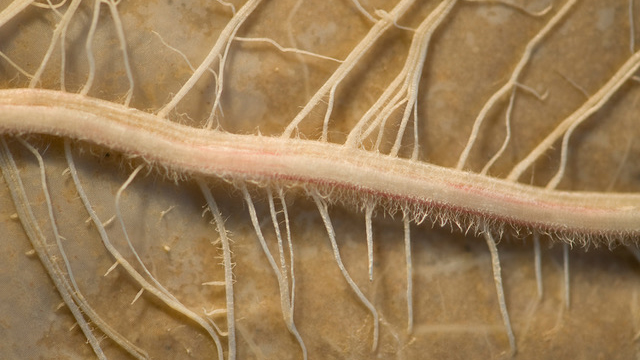This page contains automatically translated content.
Soil research taken to the roots
 Image: Andre Künzelmann/UFZ.
Image: Andre Künzelmann/UFZ.The central concern of the priority program is the consideration of the overall system of roots and soil. In particular, the interactions between roots, microorganisms and soils are to be investigated and how this results in characteristic patterns in the spatio-temporal development of physical, biological and chemical parameters. These patterns condition numerous processes in the root-soil system, such as water and nutrient uptake, carbon storage, and plant health. However, many of them have remained unexplained to date.
To close these gaps, a total of 25 research projects in various disciplines - from microbiology and plant genetics to soil chemistry, soil physics and modeling - are being launched under the umbrella of the priority program. The aim of Prof. Peth's research group is to investigate the interactions between roots and the soil adjacent to them with regard to the formation of new microstructures in the rhizosphere and the resulting changes in physical properties in situ. To this end, the formation of (micro)aggregates, the local deformation and change of soil stability in the rhizosphere and the resulting influence on local oxygen supply as an important prerequisite for the activity of microorganisms during root growth, among other things, will be investigated.
"Even though rhizosphere processes take place on very small scales, their effects are essential for two major global issues at once," explains Prof. Dr. Doris Vetterlein, an agricultural biologist at the UFZ and coordinator of the program. "In the rhizosphere, not only the plant's resource appropriation takes place, but also the carbon input into the soil. This makes our research concern highly relevant not only to food supply issues, but also to greenhouse gas sequestration."
The rhizosphere
The rhizosphere is the space in the soil directly influenced by a living root. It is the habitat for numerous organisms, including fungi, bacteria and nematodes. Plant roots release various organic compounds into the soil. These substances change pH levels, mobilize nutrients, and serve to form a special microbial community of bacteria and fungi. In the course of plant development, the roots penetrate into ever new areas of the soil and thus continuously tap into nutrients and water. A special characteristic of the rhizosphere is the pronounced gradients of chemical, biological and physical parameters. This means that extremely different living conditions for the various organisms can be found in a very small space.
This text is (abridged) taken from the Helmholtz Centre for Environmental Research (UFZ).
Contact:
Prof. Dr. Stephan Peth
University of Kassel
Department of Soil Science
Tel.: +49 561 804-1594
E-mail: peth@uni-kassel.de